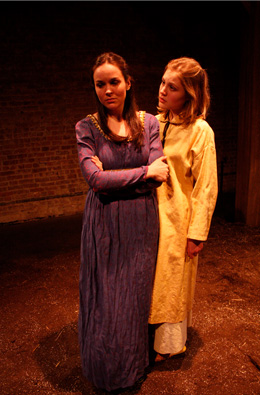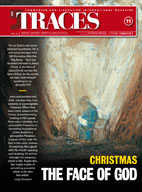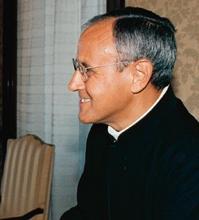
Communion & Liberation: December 2010 Archives

 Paul Claudel's extraordinary play, "The Tidings Brought to Mary" will be presented by Blackfriars Repertory Theater and the Storm Theater.
Paul Claudel's extraordinary play, "The Tidings Brought to Mary" will be presented by Blackfriars Repertory Theater and the Storm Theater.
During this giving season, we hope you will consider subscriptions for Traces magazine for your family, friends, and associates. Traces (Litterae Communionis) is the official magazine of the international Movement of Communion and Liberation and it is published in several languages. This unique gift broadens our horizons of awareness and personal conversion (conversion spoken of by Christ and strongly encouraged by Pope Benedict XVI).
The articles in Traces encourages us to make an evaluation on history, literature, politics, education, medicine, law, science and culture and describes our life in the Church in new and incisive ways, ways which help us to be more fully engaged in our own lives and in the society. Traces helps us life more fully our Catholic Faith.
As Father Julián Carrón, head of the Fraternity of Communion and Liberation (CL) suggested at a meeting with CL leaders this summer in La Thuile (Italy): "You must take the initiative that your life be pervaded by God because the substance of our happiness is this infinite enormous Love which inclined itself over our nothingness."
Subscribe today ... bringing the words and experiences of "that which we hold most dear" into the hearts and homes of others!
For more information, contact Suzanne at stanzi@clhac.com.

Follow Traces on Facebook.

Father Julián Carrón, the head of the Fraternity of Communion and Liberation, gave this message for Christmas. He writes from Milan, Italy.
In the mystery of the Incarnation, man and history
"That Christianity gives joy and breadth is also a thread that runs through my whole life. Ultimately someone who is always only in opposition could probably not endure life at all" (Light of the World, part 1). These words of Benedict XVI challenge us to ask ourselves what it means to be Christians today. Continuing to believe simply out of devotion, habit, or tradition, withdrawing into one's shell, does not meet the challenge. Similarly, reacting strongly and going on the offensive in order to recover lost territory is insufficient; the Pope even says that it would be unendurable. Neither path -withdrawing from the world or opposing it- are capable of arousing interest in Christianity, because neither respects what will always be the canon of the Christian announcement: the Gospel. Jesus entered the world with a capacity to attract that fascinated the people of His time. As Péguy said, "He did not waste His years groaning and demanding explanations of the wickedness of the times. He cut through ... making Christianity." Christ introduced into history a human presence so fascinating that anyone who ran into it had to take it into consideration, had to reject it or accept it. No one was left indifferent.
At 7:30 this morning in Rome, Pope Benedict XVI offered the Sacrifice of the Mass in the Paoline Chapel of the Vatican Apostolic Palace, for peaceful repose of the soul of Manuela Camagni, the Memor Domini who was a part of the Papal Family who died November 24 as a consequence of being hit by a car. It is not a frequent occurrence that we hear much of the inner life of the Apostolic Household and equally little is revealed about the consecrated lay people who make up the Memores Domini community of Communion & Liberation. Plus, Manuela's death, for some reason, has had interesting affect on me, not only because I am a member of the Fraternity of Communion & Liberation but because of the recorded witness of Manuela herself, and how Manuela affected the Holy Father and those with whom he lives. What follows is Pope Benedict's homily:
Dear Brothers and Sisters,

In the last days of her life, our dear Manuela used to talk about the fact that on November 29 she would have belonged to the community of Memores Domini for thirty years. And she said that with a great joy, getting ready - such was the impression - for an interior feast celebrating her path of thirty years towards the Lord, in communion with the Lord's friends. But the feast was different from what was expected: precisely on November 29 we took her to the cemetery, we sang asking for the Angels to accompany her to Heaven, we guided her to the ultimate feast, to God's great feast, to the Lamb's Wedding. Thirty years walking towards the Lord, entering the Lord's feast. Manuela was a "wise, prudent virgin," she had oil in her lamp, the oil of faith, a lived faith, a faith nourished by prayer, by a dialogue with the Lord, by her meditation on the Word of God, by communion in her friendship with Christ. And this faith was hope, wisdom, it was certainty that faith opens up to the real future. And faith was charity, it was giving herself for the others, it was living in the service of the Lord for the others. I, personally, must thank for her availability to put her energies at work in my house, with this spirit of charity and of hope that comes from faith.
She entered the Lord's feast as a prudent and wise virgin because she lived not in the superficiality of those who forget the greatness of our vocation, but in the great expectation of the eternal life; so she was ready when the Lord came.
 What follows is Pope Benedict XVI's message sent on
the occasion of the Mass of Christian Burial for Manuela Camagni, 56, a member
of the association of Memores Domini (the consecrated lay group of Communion
& Liberation) who with 3 other Memores worked for the Pope in his personal apartments
at the Vatican. As mentioned in a blog post last week, Manuela was killed
Tuesday/Wednesday after being struck by a car. The Reverend Monsignor Georg
Ganswein, the Pope's personal secretary, read the message at the funeral, Monday
in Bagno di Romagna, Emilia-Romagna (northern Italian city). The Mass of Christian Burial was celebrated at La Chiesa di San Piero in Bagno di Romagna.
What follows is Pope Benedict XVI's message sent on
the occasion of the Mass of Christian Burial for Manuela Camagni, 56, a member
of the association of Memores Domini (the consecrated lay group of Communion
& Liberation) who with 3 other Memores worked for the Pope in his personal apartments
at the Vatican. As mentioned in a blog post last week, Manuela was killed
Tuesday/Wednesday after being struck by a car. The Reverend Monsignor Georg
Ganswein, the Pope's personal secretary, read the message at the funeral, Monday
in Bagno di Romagna, Emilia-Romagna (northern Italian city). The Mass of Christian Burial was celebrated at La Chiesa di San Piero in Bagno di Romagna.
